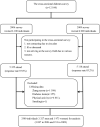Health Conditions, Lifestyle Factors and Depression in Adults in Qingdao, China: A Cross-Sectional Study
- PMID: 34054589
- PMCID: PMC8160228
- DOI: 10.3389/fpsyt.2021.508810
Health Conditions, Lifestyle Factors and Depression in Adults in Qingdao, China: A Cross-Sectional Study
Abstract
Background: Depression is a common mental illness. Previous studies suggested that health conditions and lifestyle factors were associated with depression. However, only few studies have explored the risk factors of depression in a large representative sample of the general population in the world. Methods: A population-based cross-sectional survey was conducted in the 2006 survey and 2009 survey in Qingdao, China. The participants with insufficient information were excluded: Zung score, body mass index (BMI), diabetes items, physical activity, smoking, or drinking. Finally, a total of 3,300 participants were included in this analysis. The category of depression was used in the Zung self-rating depression scale (ZSDS). The associations between different indicators of health conditions (diabetic status, BMI), lifestyle factors (physical activity, smoking, and alcohol consumption), and depression were assessed by the logistic regression model. Results: The mean Zung scores for all participants, male participants, and female participants were 29.73 ± 7.57, 28.89 ± 7.30, 30.30 ± 7.70, respectively. In all participants, those who were pre-diabetes status (OR: 1.53, 95% CI: 1.04-2.27), and irregular physical activity (OR: 0.39, 95% CI: 0.17-0.89) had an increased risk of depression. In man, the analysis showed an increased risk of depression those with pre-diabetes (OR: 2.49, 95% CI: 1.25-4.97), previously diagnosed diabetes (OR: 4.44, 95% CI: 1.58, 12.48), and in those irregular activities (OR: 0.07, 95% CI: 0.01-0.61). In women, those who were underweight (OR: 5.66, 95% CI: 1.04-30.71) had a greater risk of depression. Conclusions: These results suggested that health conditions and lifestyle factors were the potential risk factors for depression. Men with pre-diabetes, previously diagnosed diabetes, and irregular activity had an increased risk for depression; women with underweight status had a higher risk for depression.
Keywords: cross-sectional study; depression; diabetes; health conditions; lifestyle factors.
Copyright © 2021 Cui, Cui, Xu, Aslam, Bai, Li, Wu, Ma, Sun and Baloch.
Conflict of interest statement
The authors declare that the research was conducted in the absence of any commercial or financial relationships that could be construed as a potential conflict of interest.
Figures
References
-
- World Health Organization . The Global Burden of Disease: 2004 update. World Health Organization; (2008).
LinkOut - more resources
Full Text Sources
Other Literature Sources


